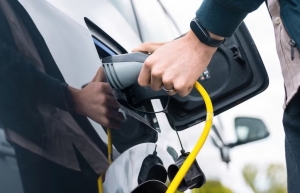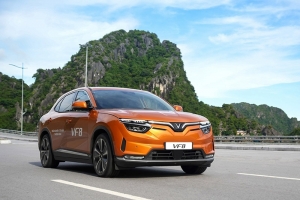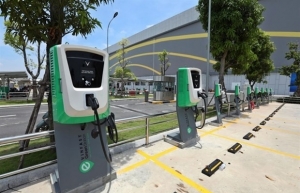Insurance groups adjust to electric vehicle trends
 |
| Some companies have been developing specific insurance plans for electric vehicle batteries |
Vietnam’s electric vehicle (EV) market is poised for dramatic expansion, according to a a study published earlier this month by BMI, Fitch Solutions’ subsidiary, which forecasts 2023 sales to double from the prior year.
The data reveals a projected 115 per cent sales increase for EVs in Vietnam for 2023, marking 18,000 units. Pure battery EV sales alone are slated for a 104 per cent jump.
Furthermore, the EV market in Vietnam is projected to boast a 13.6 per cent penetration by 2030, a marked rise from 3 per cent in 2022. The Vietnam Automobile Manufacturers Association estimates that by 2028, EV ownership could touch one million, ballooning to 3.5 million by 2040.
“From now to 2032, we project an annual growth rate of 25.8 per cent for EVs in Vietnam, with annual sales expected to hit 65,000 units. This is a substantial leap from the 8,400 units sold in 2022,” BMI’s study said.
Furthermore, EV market penetration in Vietnam is forecasted to reach 13.6 per cent by 2030, a significant uptick from the 2.9 per cent recorded in 2022.
The growth trajectory of Vietnam’s EV market can also be attributed to the aggressive production strategies of local giants such as VinFast.
A forecast in August by CNBC noted that VinFast’s intensified production in 2023, coupled with increased deliveries, will catalyse the EV market in the coming years.
BMI also highlighted, “In 2022, VinFast dominated the EV market in Vietnam, capturing over half of the market share. Meanwhile, Chinese auto manufacturers collectively held roughly the remaining half. An influx of affordable EVs from China has also played a pivotal role in fuelling the market’s growth.”
This surge in the popularity of EVs aligns with the perspective shared by Bui Gia Anh, secretary-general of the Insurance Association of Vietnam (IAV).
“The strong inclination towards EVs, primarily due to rising concerns about emissions from traditional vehicles, and pointed out that as the number of EVs on the road grows, so too does the need for specialised insurance solutions,” Anh said.
He also cited the legal framework which accommodates the development of EV.
“In an environmentally charged move, the Vietnamese government recently endorsed the Green Energy Transition Programme for the transport sector, delineating a strategic roadmap to attain net-zero greenhouse gas emissions by 2050. This initiative aspires to have all vehicles in Vietnam running on green energy or electricity by that year,” Anh said.
Experts from the Australian and New Zealand Institute of Insurance and Finance in a seminar in June touched upon China’s EV insurance insights, given the nation’s leadership in EV adoption.
While EV insurance is not novel globally, Vietnam’s insurance companies are eager to glean lessons from mature markets, especially in premium setting and risk management.
Anthony Baker, chief technical officer of Allianz Partners Asia-Pacific, noted, “Germany, for example, employs 35 different models for EV insurance. Leveraging China’s experience, it’s crucial for insurers to have a nuanced understanding of each EV make and its unique attributes. The variations in battery technology and associated risks necessitate in-depth data from repair shops and emergency services for accurate risk and price evaluations.”
Trailblazing the Vietnamese market, PTI last December introduced an insurance plan for e-car batteries, covering unforeseen damages from accidents or natural calamities, but excluding natural wear, inherent flaws, or misuse of charging equipment.
As Vietnam’s maiden insurer to offer EV battery insurance, PTI’s venture signals a potential shift, with other firms predicted to recalibrate their traditional insurance offerings to cater to battery-run vehicles.
For now, Vietnamese EV owners can opt for three distinct insurance covers: excluding battery, inclusive of battery, or solely the battery. The premium rates align closely with those for petrol vehicles. On a global scale, new-energy vehicle insurance usually commands a 15-20 per cent premium over conventional vehicles.
“As EVs still carve their niche in Vietnam, specialised insurance remains scant. But an imminent surge in demand might spur fierce insurance market competition, reminiscent of the existing landscape for traditional vehicles,” Anh of the IAV said.
 | Vietnam-a market of strong potential and excitement for its electric vehicles Vietnam’s electric vehicle market is promising and has a very bright future, but a number of issues must be tackled for the sector to truly flourish. |
 | Vingroup’s revenues see a soar in the second quarter of 2023 Vingroup reported a revenue increase in the first half of 2023 thanks to the contribution from the sale of electric vehicle products. |
 | Vietnam to take bold move to promote EV industry, green transition Buyers of electric vehicles (EVs) could receive an incentive totalling 1,000 USD per purchase. |
What the stars mean:
★ Poor ★ ★ Promising ★★★ Good ★★★★ Very good ★★★★★ Exceptional
Related Contents
Latest News
More News
- Insurers accelerate post-typhoon recovery (October 28, 2025 | 15:31)
- Shinhan Life Vietnam builds growth on people strategy (October 07, 2025 | 09:45)
- Insurance sector initiates rapid response after Typhoon Bualoi devastation (October 03, 2025 | 18:25)
- Non-life insurers face mounting pressure after typhoon hits motor sector (October 02, 2025 | 18:59)
- Prudential Vietnam delivers responsible investment package (September 25, 2025 | 10:37)
- Insurers struggle to keep pace with EV rapid adoption (August 29, 2025 | 17:12)
- Non-life insurance market in sees bright spots in H1 despite rising challenges (August 28, 2025 | 16:21)
- Life insurance rebounds with renewed growth and trust (August 06, 2025 | 18:04)
- Global Care launches Vietnam’s first insurance KOL platform (July 25, 2025 | 09:42)
- Liberty Insurance leaves mark at 2025 Insurance Asia Awards with dual wins (July 14, 2025 | 07:27)

 Tag:
Tag:

















 Mobile Version
Mobile Version